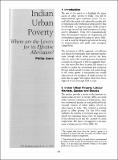| dc.contributor.author | Amis, Philip | en |
| dc.date.accessioned | 2016-02-24T15:33:48Z | |
| dc.date.available | 2016-02-24T15:33:48Z | |
| dc.date.issued | 01/04/1997 | en |
| dc.identifier.citation | Amis, P. (1997) Indian Urban Poverty: . IDS Bulletin 28(2): 94-105 | en |
| dc.identifier.issn | 1759-5436 | en |
| dc.identifier.uri | https://opendocs.ids.ac.uk/opendocs/handle/20.500.12413/9208 | |
| dc.description.abstract | Summaries This article reviews the literature on the causes of urban poverty in India, and explores possible policy responses. According to the author, urban poverty programmes have failed to address the most important mechanism through which urban poverty can be reduced: the general process of social and economic development. Municipalities have an important role to play in providing a basis for this development: creating conditions that facilitates economic growth (including law and order), providing health and education, and improving the local environment. To do this, municipalities require access to revenues, a taxation system that rewards them for good performance, the right political coalitions, and commitment to work with the private sector and NGOs. | en |
| dc.format.extent | 12 | en |
| dc.publisher | Institute of Development Studies | en |
| dc.relation.ispartofseries | IDS Bulletin Vol. 28 Nos. 2 | en |
| dc.rights.uri | http://www.ids.ac.uk/files/dmfile/IDSOpenDocsStandardTermsOfUse.pdf | en |
| dc.title | Indian Urban Poverty: | en |
| dc.type | Article | en |
| dc.rights.holder | © 1997 Institue of Development Studies | en |
| dc.identifier.doi | 10.1111/j.1759-5436.1997.mp28002010.x | en |

